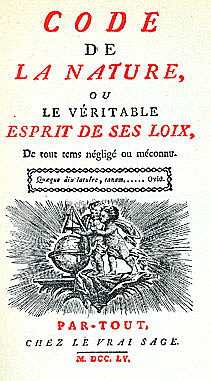Étienne-Gabriel Morelly

Étienne-Gabriel Morelly (French: [mɔʁɛli]; 1717, Vitry-le-François – 1778) was a French utopian thinker and novelist. An otherwise "obscure tax official",[1] Morelly wrote two books on education and a critique of Montesquieu. As well he is thought to be (perhaps erroneously) the author of The Code of Nature, which was published anonymously in France in 1755. This book, a basis of thought for later socialist and Communist thinkers, criticized the society of his day, promoted a social order without avarice and proposed a constitution intended to lead to an egalitarian society without property, marriage, church or police.[2]
Outline
According to The Code of Nature, "...where no property exists, none of its pernicious consequences could exist...." As Morelly believed that almost all social and moral ills were a consequence of private property, his proposed constitution eliminates most private property.
Because of this latter characteristic of his utopia, Morelly is often seen as a significant forerunner of later socialist and communist thinkers. François-Noël Babeuf, Charles Fourier, Pierre-Joseph Proudhon, Louis Blanc, Friedrich Engels, and Karl Marx all discussed Morelly's ideas in their own writing.
Morelly's position
Among the "sacred and fundamental laws" Morelly proposed was "Nothing in society will belong to anyone, either as a personal possession or as capital goods, except the things for which the person has immediate use, for either his needs, his pleasures, or his daily work." He was opposed to the possession of property beyond what an individual needed and, especially, to private property used to employ others.
How, then, would workers gain access to tools and equipment beyond personal possession if their job required it? According to Morelly, "...all these durable products will be gathered together in public stores in order to be distributed to all the citizens, daily or at some other specified interval ..."
He also proposed banning of trade between individuals: "In accordance with the sacred laws, nothing will be sold or exchanged between citizens. Someone who needs, for example greens, vegetables or fruits, will go to the public square, which is where these items will have been brought by the man who cultivate them, and take what he needs for one day only."
Life
Morelly is often identified as an obscure tutor about whom almost nothing is known except that he lived in a small town in northwestern France, Vitry-le-François.
Works
- Essai sur l'esprit humain, 1743
- Essai sur le coeur humain, 1745
- Le Prince, les délices des coeurs, ou traité des qualités d'un grand roi et système d'un sage gouvernement [The Prince, the delights of the heart, or, A treatise on the qualities of a great king and system of wise government], 1751
- Code de la nature, ou de véritable esprit de ses lois, 1755
See also
References
- ↑ Michael Sonenscher, Sans-Culottes: An Eighteenth-Century Emblem in the French Revolution, Princeton University Press, 2008, p.229
- ↑ The Cambridge History of Eighteenth-Century Political Thought, ed. Mark Goldie and Robert Wokler, Cambridge University Press, 2006, p.762